Sonnet 18 By William Shakespeare 赏析
- 格式:docx
- 大小:17.42 KB
- 文档页数:2
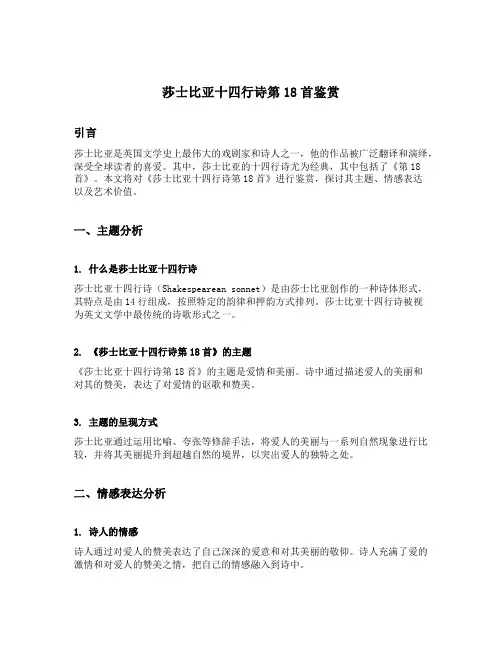
莎士比亚十四行诗第18首鉴赏引言莎士比亚是英国文学史上最伟大的戏剧家和诗人之一,他的作品被广泛翻译和演绎,深受全球读者的喜爱。
其中,莎士比亚的十四行诗尤为经典,其中包括了《第18首》。
本文将对《莎士比亚十四行诗第18首》进行鉴赏,探讨其主题、情感表达以及艺术价值。
一、主题分析1. 什么是莎士比亚十四行诗莎士比亚十四行诗(Shakespearean sonnet)是由莎士比亚创作的一种诗体形式,其特点是由14行组成,按照特定的韵律和押韵方式排列。
莎士比亚十四行诗被视为英文文学中最传统的诗歌形式之一。
2. 《莎士比亚十四行诗第18首》的主题《莎士比亚十四行诗第18首》的主题是爱情和美丽。
诗中通过描述爱人的美丽和对其的赞美,表达了对爱情的讴歌和赞美。
3. 主题的呈现方式莎士比亚通过运用比喻、夸张等修辞手法,将爱人的美丽与一系列自然现象进行比较,并将其美丽提升到超越自然的境界,以突出爱人的独特之处。
二、情感表达分析1. 诗人的情感诗人通过对爱人的赞美表达了自己深深的爱意和对其美丽的敬仰。
诗人充满了爱的激情和对爱人的赞美之情,把自己的情感融入到诗中。
2. 诗中情感的转折《莎士比亚十四行诗第18首》中情感经历了由赞美到忧伤的转折。
在诗的前几行,诗人对爱人进行了赞美,表达了自己对其美丽的深深敬仰之情。
然而,在诗的后半部分,情感转向了忧伤,诗人担心时间的流逝会将爱人的美丽消逝,这种忧伤的情感为整首诗增添了深刻的情感色彩。
三、艺术价值分析1. 诗歌运用的修辞手法《莎士比亚十四行诗第18首》使用了丰富多样的修辞手法,比如比喻、夸张、对比等,这些修辞手法使整首诗充满了艺术魅力,具有很高的艺术价值。
2. 渲染的意境诗中通过对爱人美丽的描绘和对时间流逝的担忧,营造了一种诗意的意境。
诗人通过对自然现象的描绘,将爱人的美丽与大自然相较,突出了爱人的独特之处,同时也增加了诗歌的艺术感染力。
3. 对爱情的思考《莎士比亚十四行诗第18首》可以说是对爱情最美丽和深刻的思考之一。
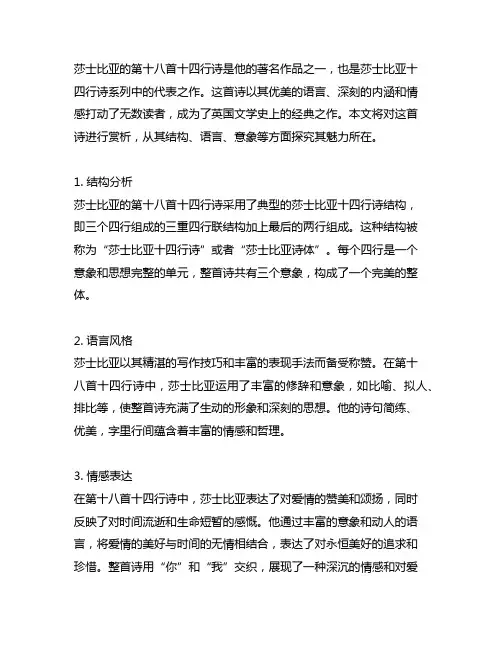
莎士比亚的第十八首十四行诗是他的著名作品之一,也是莎士比亚十四行诗系列中的代表之作。
这首诗以其优美的语言、深刻的内涵和情感打动了无数读者,成为了英国文学史上的经典之作。
本文将对这首诗进行赏析,从其结构、语言、意象等方面探究其魅力所在。
1. 结构分析莎士比亚的第十八首十四行诗采用了典型的莎士比亚十四行诗结构,即三个四行组成的三重四行联结构加上最后的两行组成。
这种结构被称为“莎士比亚十四行诗”或者“莎士比亚诗体”。
每个四行是一个意象和思想完整的单元,整首诗共有三个意象,构成了一个完美的整体。
2. 语言风格莎士比亚以其精湛的写作技巧和丰富的表现手法而备受称赞。
在第十八首十四行诗中,莎士比亚运用了丰富的修辞和意象,如比喻、拟人、排比等,使整首诗充满了生动的形象和深刻的思想。
他的诗句简练、优美,字里行间蕴含着丰富的情感和哲理。
3. 情感表达在第十八首十四行诗中,莎士比亚表达了对爱情的赞美和颂扬,同时反映了对时间流逝和生命短暂的感慨。
他通过丰富的意象和动人的语言,将爱情的美好与时间的无情相结合,表达了对永恒美好的追求和珍惜。
整首诗用“你”和“我”交织,展现了一种深沉的情感和对爱情的信仰。
4. 意象赏析在第十八首十四行诗中,莎士比亚运用了许多意象来赞美爱情和探讨永恒。
“你的美丽”、“夏天的一天”、“时间的倒流”等意象,都展现了爱情的美好和永恒。
这些意象在诗中起到了丰富的象征意义,使整首诗充满了深刻的内涵和情感。
5. 主题探讨莎士比亚的第十八首十四行诗主要探讨了爱情、美好与永恒的主题。
他通过丰富的意象和深刻的思想,表达了对爱情的赞美和对永恒美好的追求。
与此他也深刻地反映了时间的流逝和生命的短暂,从而给予读者对生命的思考和感悟。
莎士比亚的第十八首十四行诗以其优美的语言、深刻的内涵和情感打动了无数读者。
通过对其结构、语言、意象、情感和主题的赏析,我们不仅更深刻地理解了这首诗的魅力所在,也更深刻地领略了莎士比亚伟大的艺术魅力。

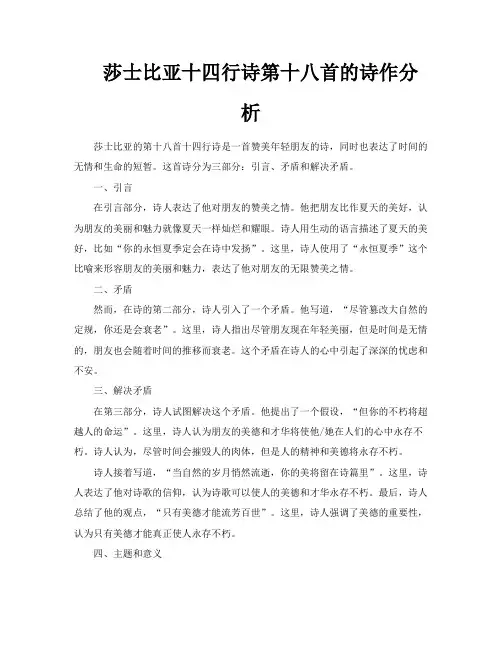
莎士比亚十四行诗第十八首的诗作分析莎士比亚的第十八首十四行诗是一首赞美年轻朋友的诗,同时也表达了时间的无情和生命的短暂。
这首诗分为三部分:引言、矛盾和解决矛盾。
一、引言在引言部分,诗人表达了他对朋友的赞美之情。
他把朋友比作夏天的美好,认为朋友的美丽和魅力就像夏天一样灿烂和耀眼。
诗人用生动的语言描述了夏天的美好,比如“你的永恒夏季定会在诗中发扬”。
这里,诗人使用了“永恒夏季”这个比喻来形容朋友的美丽和魅力,表达了他对朋友的无限赞美之情。
二、矛盾然而,在诗的第二部分,诗人引入了一个矛盾。
他写道,“尽管篡改大自然的定规,你还是会衰老”。
这里,诗人指出尽管朋友现在年轻美丽,但是时间是无情的,朋友也会随着时间的推移而衰老。
这个矛盾在诗人的心中引起了深深的忧虑和不安。
三、解决矛盾在第三部分,诗人试图解决这个矛盾。
他提出了一个假设,“但你的不朽将超越人的命运”。
这里,诗人认为朋友的美德和才华将使他/她在人们的心中永存不朽。
诗人认为,尽管时间会摧毁人的肉体,但是人的精神和美德将永存不朽。
诗人接着写道,“当自然的岁月悄然流逝,你的美将留在诗篇里”。
这里,诗人表达了他对诗歌的信仰,认为诗歌可以使人的美德和才华永存不朽。
最后,诗人总结了他的观点,“只有美德才能流芳百世”。
这里,诗人强调了美德的重要性,认为只有美德才能真正使人永存不朽。
四、主题和意义这首诗的主题是时间和生命的短暂以及美德的不朽。
诗人通过对朋友的赞美和忧虑,表达了他对时间的无情和生命的短暂的感慨。
然而,他也指出美德和精神可以超越时间和生命的限制,永存不朽。
这首诗的意义在于提醒人们珍惜时间和生命,追求美德和精神的不朽。
五、艺术手法这首诗的艺术手法主要包括比喻、对比和象征等。
诗人通过比喻将朋友比作夏天的美好,突出了朋友的美丽和魅力。
同时,诗人也通过对比引入了矛盾,指出时间是无情的,朋友也会衰老。
最后,诗人通过象征将诗歌视为美德和精神的不朽载体,强调了诗歌的价值和意义。
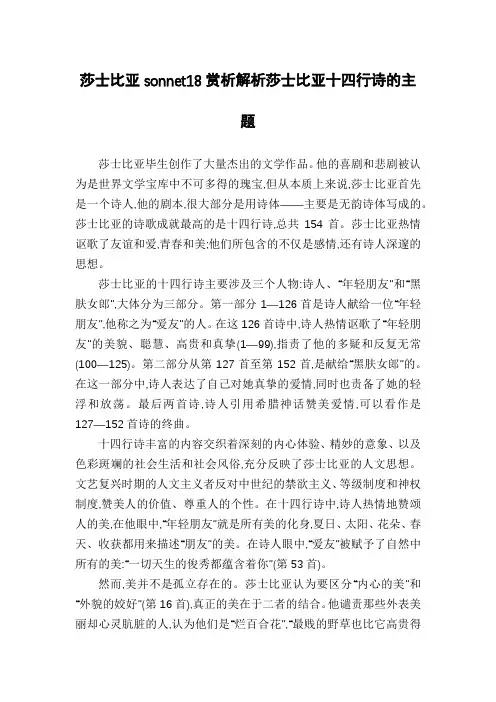
莎士比亚sonnet18赏析解析莎士比亚十四行诗的主题莎士比亚毕生创作了大量杰出的文学作品。
他的喜剧和悲剧被认为是世界文学宝库中不可多得的瑰宝,但从本质上来说,莎士比亚首先是一个诗人,他的剧本,很大部分是用诗体――主要是无韵诗体写成的。
莎士比亚的诗歌成就最高的是十四行诗,总共154首。
莎士比亚热情讴歌了友谊和爱,青春和美;他们所包含的不仅是感情,还有诗人深邃的思想。
莎士比亚的十四行诗主要涉及三个人物:诗人、“年轻朋友”和“黑肤女郎”,大体分为三部分。
第一部分1―126首是诗人献给一位“年轻朋友”,他称之为“爱友”的人。
在这126首诗中,诗人热情讴歌了“年轻朋友”的美貌、聪慧、高贵和真挚(1―99),指责了他的多疑和反复无常(100―125)。
第二部分从第127首至第152首,是献给“黑肤女郎”的。
在这一部分中,诗人表达了自己对她真挚的爱情,同时也责备了她的轻浮和放荡。
最后两首诗,诗人引用希腊神话赞美爱情,可以看作是127―152首诗的终曲。
十四行诗丰富的内容交织着深刻的内心体验、精妙的意象、以及色彩斑斓的社会生活和社会风俗,充分反映了莎士比亚的人文思想。
文艺复兴时期的人文主义者反对中世纪的禁欲主义、等级制度和神权制度,赞美人的价值、尊重人的个性。
在十四行诗中,诗人热情地赞颂人的美,在他眼中,“年轻朋友”就是所有美的化身,夏日、太阳、花朵、春天、收获都用来描述“朋友”的美。
在诗人眼中,“爱友”被赋予了自然中所有的美:“一切天生的俊秀都蕴含着你”(第53首)。
然而,美并不是孤立存在的。
莎士比亚认为要区分“内心的美”和“外貌的姣好”(第16首),真正的美在于二者的结合。
他谴责那些外表美丽却心灵肮脏的人,认为他们是“烂百合花”,“最贱的野草也比它高贵得多”(第94首)。
诗人不但赞颂人的美,还赞颂人的永恒。
在十四行诗中,莎士比亚经常提到时间,认为它是青春和美丽不共戴天的敌人。
因为时间“要把你青春的白昼化作黑夜”(第15首),所以美会变丑、生命会终结。
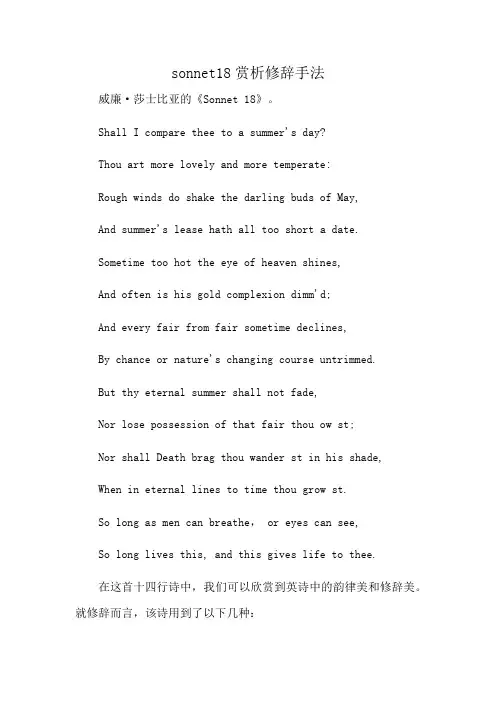
sonnet18赏析修辞手法威廉·莎士比亚的《Sonnet 18》。
Shall I compare thee to a summer's day?Thou art more lovely and more temperate:Rough winds do shake the darling buds of May,And summer's lease hath all too short a date.Sometime too hot the eye of heaven shines,And often is his gold complexion dimm'd;And every fair from fair sometime declines,By chance or nature's changing course untrimmed.But thy eternal summer shall not fade,Nor lose possession of that fair thou ow st;Nor shall Death brag thou wander st in his shade,When in eternal lines to time thou grow st.So long as men can breathe, or eyes can see,So long lives this, and this gives life to thee.在这首十四行诗中,我们可以欣赏到英诗中的韵律美和修辞美。
就修辞而言,该诗用到了以下几种:明喻(Simile)/设问(Rhetorical Question):Shall I compare thee to a summer's day? Thou art more lovely and more temperate.诗人把好友Herbet比作夏日,并就此提出疑问“我应把你比作夏日吗?”,但随之又否定了自己的想法,因为他认为Herbet那更可爱更柔和的美胜过夏日。
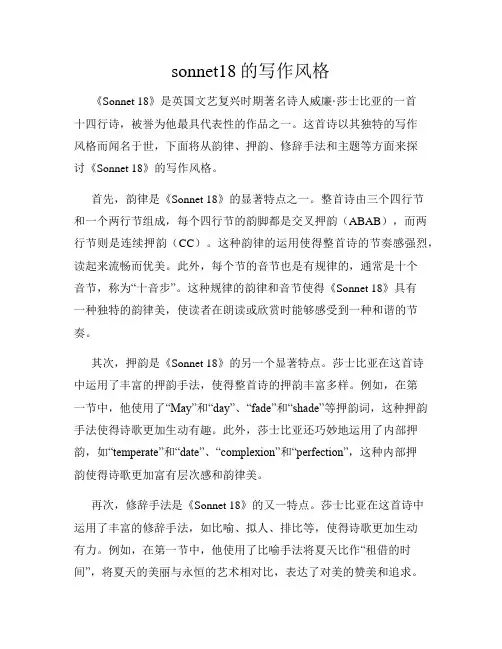
sonnet18的写作风格《Sonnet 18》是英国文艺复兴时期著名诗人威廉·莎士比亚的一首十四行诗,被誉为他最具代表性的作品之一。
这首诗以其独特的写作风格而闻名于世,下面将从韵律、押韵、修辞手法和主题等方面来探讨《Sonnet 18》的写作风格。
首先,韵律是《Sonnet 18》的显著特点之一。
整首诗由三个四行节和一个两行节组成,每个四行节的韵脚都是交叉押韵(ABAB),而两行节则是连续押韵(CC)。
这种韵律的运用使得整首诗的节奏感强烈,读起来流畅而优美。
此外,每个节的音节也是有规律的,通常是十个音节,称为“十音步”。
这种规律的韵律和音节使得《Sonnet 18》具有一种独特的韵律美,使读者在朗读或欣赏时能够感受到一种和谐的节奏。
其次,押韵是《Sonnet 18》的另一个显著特点。
莎士比亚在这首诗中运用了丰富的押韵手法,使得整首诗的押韵丰富多样。
例如,在第一节中,他使用了“May”和“day”、“fade”和“shade”等押韵词,这种押韵手法使得诗歌更加生动有趣。
此外,莎士比亚还巧妙地运用了内部押韵,如“temperate”和“date”、“complexion”和“perfection”,这种内部押韵使得诗歌更加富有层次感和韵律美。
再次,修辞手法是《Sonnet 18》的又一特点。
莎士比亚在这首诗中运用了丰富的修辞手法,如比喻、拟人、排比等,使得诗歌更加生动有力。
例如,在第一节中,他使用了比喻手法将夏天比作“租借的时间”,将夏天的美丽与永恒的艺术相对比,表达了对美的赞美和追求。
此外,在整首诗中,莎士比亚还使用了拟人手法,如将太阳形容为“眼睛”,将死亡形容为“永恒的睡眠”,这种拟人手法使得诗歌更加生动有趣,给人以强烈的视觉和感官的冲击。
最后,主题是《Sonnet 18》的核心。
整首诗以赞美之情贯穿始终,表达了诗人对美的追求和对爱情的赞美。
诗人通过将夏天的美丽与艺术相对比,表达了对美的追求和对永恒的渴望。
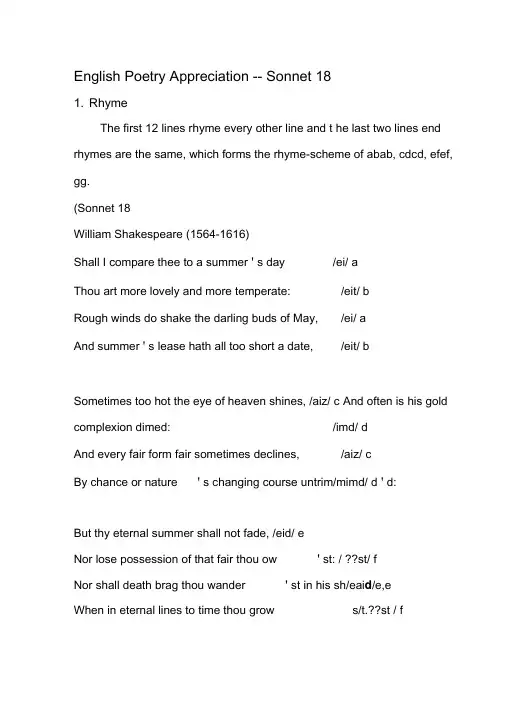
English Poetry Appreciation -- Sonnet 181. RhymeThe first 12 lines rhyme every other line and t he last two lines end rhymes are the same, which forms the rhyme-scheme of abab, cdcd, efef, gg.(Sonnet 18William Shakespeare (1564-1616)Shall I compare thee to a summer ' s day /ei/ aThou art more lovely and more temperate: /eit/ bRough winds do shake the darling buds of May, /ei/ aAnd summer ' s lease hath all too short a date, /eit/ bSometimes too hot the eye of heaven shines, /aiz/ c And often is his gold complexion dimed: /imd/ dAnd every fair form fair sometimes declines, /aiz/ cBy chance or nature ' s changing course untrim/mimd/ d ' d:But thy eternal summer shall not fade, /eid/ eNor lose possession of that fair thou ow ' st: / ??st/ fNor shall death brag thou wander ' st in his sh/eai d/e,eWhen in eternal lines to time thou grow s/t.??st / fSo long as men can breathe, or eyes can see, /i?/ gSo long lives this, and this gives life to thee. /i?/ g)2. MeterEach line in this sonnet is in iambic pentameter which means each line has five feet, usually an unaccented syllable followed by an accented syllable.For example, we can divide the first line into five independent feet as “ Shall I / compare / thee to/ a sum / mer with accen'tss day on shall, com, thee, a, mer respectively.(Sonnet 18William Shakespeare (1564-1616)Shall I/ compare/ thee to/ a sum/ mer' s dayThou art/ more love/ly and/ more tem/perate:Rough winds/ do shake/ the dar/ling buds/ of May,And sum/ mer' s lea/sehath all/ too short/ a date:Sometimes/ too hot/ the eye/ of hea/ven shinesAnd of/ten is/ his gold/ complexion dimm ' d; And eve/ry fair/ form fair/ sometimes/ declines,By chance/ or na/tu re 's changi/ncgourse un/ trimm 'd;But thy/ eter/ nal sum/mer shall/ not fade,Nor lose/ posse/ssion of/ that fair/ thou ow ' st;Nor shall/ death brag/ thou wan/ der' st/ihis shade.When in/ eter/nal lines/ to time/ thou grow ' st:So long/ as men/ can breathe/, or eyes/ can see,So Iong/ lives this/, and this/ gives life/ to thee.)3. The Rhetorical DevicesSimile and Rhetoric Questi onExample: Shall I compare thee to a summer ' s daySimile: Summer and you” are not similar on the surface, but virtually they are the represe ntatives of beauty.Rhetoric Questio n: It is also a rhetorical questio n, that is, formally it s' a question. Readers don't need to answer because the answer is very clear. MetaphorExample: And summer' s lease hath all too short a date:The summer s day is compared to a house, which is the thing we lend from the nature. Therefore, it ' period of use is limited, and it also in si nu ates the time that the duratio n of youth and beauty is limited.Personi ficati onExample: And often is his gold complexion dimm' d;Obviously the poet compares the sun to a man, so he depicts his complexi on. (Complexi on is usually used to describe some on e.)HyperboleExample: But thy eter nal summer shall not fade,Accord ing to the laws of n ature, every beautiful thing will gradually lose their beauty, so how can the beauty of the person who the poet describes be eter nal4. ThemeIn the beg inning quatra in, the poet compares his frie nd to a beautiful summer s day in order to arouse readers' wonderful imagination. However, the poet realizes that the metaphor cant express his high praise for his friend because summer will fade away though it's beautiful. Then how to make the beauty of his friend eternal The poet fin ally thi nks of the poetry. He thi nks that with the power of the poem, he can make the beauty of his friend immortal. That is to say, the beauty of his friend is immoral in that the poetry is eternal.In a word, the poem expresses the two themes. For one thi ng, the poet highly praises the beauty of his friend, and for another thing, the poet also eulogizes the poetry art s'beauty and immortality.。
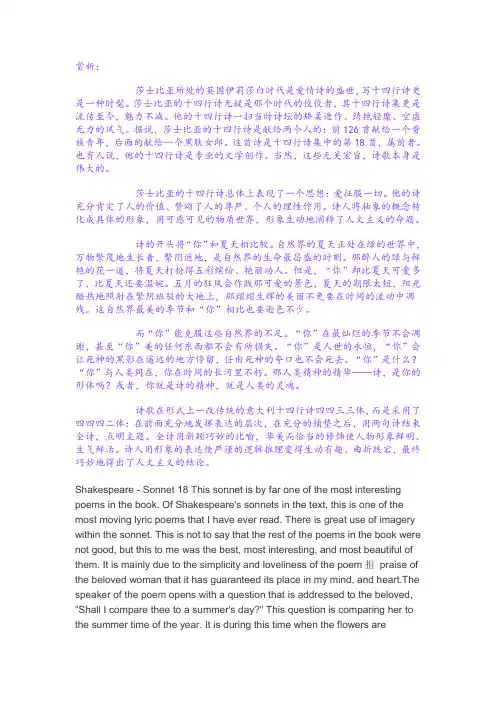
赏析:莎士比亚所处的英国伊莉莎白时代是爱情诗的盛世,写十四行诗更是一种时髦。
莎士比亚的十四行诗无疑是那个时代的佼佼者,其十四行诗集更是流传至今,魅力不减。
他的十四行诗一扫当时诗坛的矫柔造作、绮艳轻糜、空虚无力的风气。
据说,莎士比亚的十四行诗是献给两个人的:前126首献给一个贵族青年,后面的献给一个黑肤女郎。
这首诗是十四行诗集中的第18首,属前者。
也有人说,他的十四行诗是专业的文学创作。
当然,这些无关宏旨,诗歌本身是伟大的。
莎士比亚的十四行诗总体上表现了一个思想:爱征服一切。
他的诗充分肯定了人的价值、赞颂了人的尊严、个人的理性作用。
诗人将抽象的概念转化成具体的形象,用可感可见的物质世界,形象生动地阐释了人文主义的命题。
诗的开头将“你”和夏天相比较。
自然界的夏天正处在绿的世界中,万物繁茂地生长着,繁阴遮地,是自然界的生命最昌盛的时刻。
那醉人的绿与鲜艳的花一道,将夏天打扮得五彩缤纷、艳丽动人。
但是,“你”却比夏天可爱多了,比夏天还要温婉。
五月的狂风会作践那可爱的景色,夏天的期限太短,阳光酷热地照射在繁阴班驳的大地上,那熠熠生辉的美丽不免要在时间的流动中凋残。
这自然界最美的季节和“你”相比也要逊色不少。
而“你”能克服这些自然界的不足。
“你”在最灿烂的季节不会凋谢,甚至“你”美的任何东西都不会有所损失。
“你”是人世的永恒,“你”会让死神的黑影在遥远的地方停留,任由死神的夸口也不会死去。
“你”是什么?“你”与人类同在,你在时间的长河里不朽。
那人类精神的精华——诗,是你的形体吗?或者,你就是诗的精神,就是人类的灵魂。
诗歌在形式上一改传统的意大利十四行诗四四三三体,而是采用了四四四二体:在前面充分地发挥表达的层次,在充分的铺垫之后,用两句诗结束全诗,点明主题。
全诗用新颖巧妙的比喻,华美而恰当的修饰使人物形象鲜明、生气鲜活。
诗人用形象的表达使严谨的逻辑推理变得生动有趣、曲折跌宕,最终巧妙地得出了人文主义的结论。
Shakespeare - Sonnet 18 This sonnet is by far one of the most interesting poems in the book. Of Shakespeare's sonnets in the text, this is one of the most moving lyric poems that I have ever read. There is great use of imagery within the sonnet. This is not to say that the rest of the poems in the book were not good, but this to me was the best, most interesting, and most beautiful of them. It is mainly due to the simplicity and loveliness of the poem抯praise of the beloved woman that it has guaranteed its place in my mind, and heart.The speaker of the poem opens with a question that is addressed to the beloved, "Shall I compare thee to a summer's day?" This question is comparing her to the summer time of the year. It is during this time when the flowers areblooming, trees are full of leaves, the weather is warm, and it is generally thought of as an enjoyable time during the year. The following eleven lines in the poem are also dedicated to similar comparisons between the beloved and summer days. In lines 2 and 3, the speaker explains what mainly separates the young woman from the summer's day: she is "more lovely and more temperate." (Line 2) Summer's days tend toward extremes: they are sometimes shaken by "rough winds" (line3) which happens and is not always as welcoming as the woman. However in line 4, the speaker gives the feeling again that the summer months are often to short by saying, "And summer抯lease hath too short a date." In the summer days, the sun, "the eye of heaven" (line 5), often shines "too hot," or too dim, "his gold complexion dimmed" (line 6), that is there are many hot days during the summer but soon the sun begins to set earlier at night because autumn is approaching. Summer is moving along too quickly for the speaker, its time here needs to be longer, and it also means that the chilling of autumn is coming upon us because the flowers will soon be withering, as "every fair from fair sometime declines." (Line 7) The final portion of the sonnet tells how the beloved differs from the summer in various respects. Her beauty will be one that lasts forever, "Thy eternal summer shall not fade." (Line 9), and never end or die. In the couplet at the bottom, the speaker explains how that the beloved's beauty will accomplish this everlasting life unlike a summer. And it is because her beauty is kept alive in this poem, which will last forever. It will live "as long as men can breathe or eyes can see." (Line 13)On the surface, the poem is on the surface simply a statement of praise about the beauty of the beloved woman and perhaps summer to the speaker is sometimes too unpleasant with the extremes of windiness and heat that go along with it. However, the beloved in the poem is always mild and temperate by her nature and nothing at all like the summer. It is incidentally brought to life as being described as the "eye of heaven" with its "gold complexion". The imagery throughout the sonnet is simple and attainable to the reader, which is a key factor in understanding the poem. Then the speaker begins to describe the summer again with the "darling buds of May" giving way to the " summer抯lease", springtime moving into the warmth of the summer. The speaker then starts to promise to talk about this beloved, that is so great and awing that she is to live forever in this sonnet. The beloved is so great that the speaker will even go as far as to say that, "So long as men breathe, or eyes can see," the woman will live. The language is almost too simple when comparing it to the rest of Shakespeare抯sonnets; it is not heavy with alliteration or verse, and nearly every line is its own self-containedclause, almost every line ends with some punctuation that effects a pause. But it is this that makes Sonnet18 stand out for the rest in the book. It is much more attainable to understand and it allows for the reader to fully understand how great this beloved truly is because she may live forever in it. An important theme of the sonnet, as it is an important theme throughout much of the poetry in general, is the power of the speaker's poem to defy time and last forever. And so by doing this it is then carrying the beauty of the beloved down to future generations and eventually for al of eternity. The beloved's "eternal summer" shall not fade precisely because it is embodied in the sonnet: "So long as men can breathe or eyes can see," (line 13) the speaker writes in the couplet, "So long lives this, and this gives life to thee."(Line 14) With this the speaker is able to accomplish what many have done in poetry and that is to give the gift of an eternal life to someone that they believe is special and outshines everyone else around them. Perhaps it is because of a physical beauty that the speaker see, but I believe that it is more because of the internal beauty as seen in line 2, "Thou art more lovely and more temperate", that the beloved is deserving to live on forever.。
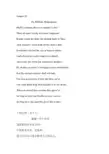
Sonnet 18By William ShakespeareShall I compare thee to a summer’s day?Thou art more lovely and more temperate: Rough winds do shake the darling buds of May, And summer’s lease hath all too short a date: Sometimes too hot the eye of heaven shinesAnd often is his gold complexion dimed;And every fair form fair sometimes declines,By chance or nature’s changing course untrimmed; But thy eternal summer shall not fade,Nor lose possession of that fair thou ow’st;Nor shall death brag thou wander’st in his shade. When in eternal lines to time thou grow’st:So long as men can breathe,or eyes can see,So long lives this,and this gives life to thee.十四行诗(其十八)威廉·莎士比亚我能把你比作夏日吗?尽管你更可爱、更温和;夏日的狂风可能会摧残五月的花儿,季节的限制又减少了可拥有的日光;天空的巨眼有时过于灼热,常使自身的辉煌无故湮没;每一种美都会消逝,不管愿意或是无奈;然而你这盛夏将永存不朽,连你所有的美都不会褪去;死神不忍逼近,生命只会长存;只要人类能呼吸,能看见;我的诗就会存在,而你的生命也会延续。
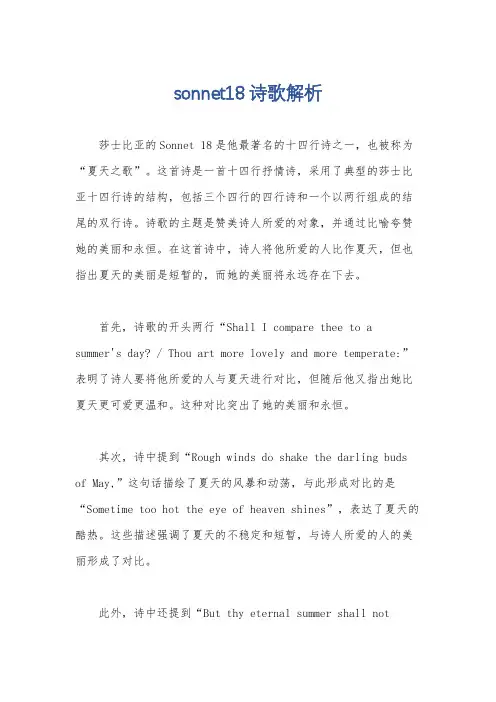
sonnet18诗歌解析莎士比亚的Sonnet 18是他最著名的十四行诗之一,也被称为“夏天之歌”。
这首诗是一首十四行抒情诗,采用了典型的莎士比亚十四行诗的结构,包括三个四行的四行诗和一个以两行组成的结尾的双行诗。
诗歌的主题是赞美诗人所爱的对象,并通过比喻夸赞她的美丽和永恒。
在这首诗中,诗人将他所爱的人比作夏天,但也指出夏天的美丽是短暂的,而她的美丽将永远存在下去。
首先,诗歌的开头两行“Shall I compare thee to a summer's day? / Thou art more lovely and more temperate:”表明了诗人要将他所爱的人与夏天进行对比,但随后他又指出她比夏天更可爱更温和。
这种对比突出了她的美丽和永恒。
其次,诗中提到“Rough winds do shake the darling buds of May,”这句话描绘了夏天的风暴和动荡,与此形成对比的是“Sometime too hot the eye of heaven shines”,表达了夏天的酷热。
这些描述强调了夏天的不稳定和短暂,与诗人所爱的人的美丽形成了对比。
此外,诗中还提到“But thy eternal summer shall notfade”,这句话表达了诗人对所爱人美丽永恒的信念,即使时间流逝,她的美丽也不会凋谢。
最后,诗歌的结尾两行“So long as men can breathe oreyes can see, / So long lives this, and this gives life to thee.”表达了诗人的信念,即只要人类存在,这首诗也将永存下去,而她的美丽也将因此而得以永生。
总的来说,Sonnet 18是一首赞美之歌,通过对比夏天的短暂和变化与所爱人的永恒美丽,表达了诗人对所爱人的赞美和珍视之情。
这首诗以其优美的语言和深刻的意境,成为了莎士比亚诗歌中的经典之作。
sonnet 18诗歌赏析摘要:一、概述莎士比亚sonnet 18诗歌背景及地位二、分析诗歌主题及情感表达三、解读诗歌艺术手法及特点四、评价诗歌在文学史上的影响和价值正文:莎士比亚的sonnet 18诗歌是著名的十四行诗之一,被誉为“莎士比亚十四行诗中最美丽的一首”。
这首诗歌以对美丽永恒的赞美为主题,表达了人类对美好事物的渴望与珍视。
首先,诗歌背景方面,sonnet 18与莎士比亚的其他十四行诗一样,创作于16世纪末17世纪初。
这首诗歌写给了一位年轻的男子,表达了诗人对这位男子美丽、纯洁和才华的赞美。
在诗歌中,莎士比亚将这位男子比喻为春天的花朵,寓意着他的美丽和青春。
其次,诗歌主题及情感表达方面,sonnet 18以春天为背景,通过对大自然的描绘,表现了诗人对美丽事物的热爱。
诗歌中,莎士比亚运用了诸多比喻、拟人等修辞手法,将自然景象与男子的美貌、气质相融合,传达出诗人对美好事物的渴望和珍视。
同时,诗人也意识到美丽是短暂的,春天总会过去,因此诗歌中蕴含着对永恒美丽的追求。
在艺术手法及特点方面,sonnet 18遵循了莎士比亚十四行诗的格式,具有典型的三韵句和五韵句结构。
诗歌韵律优美,行文流畅,充满了诗意。
此外,诗人巧妙地运用了押韵、抑扬顿挫等手法,使诗歌更具音乐性。
在语言上,莎士比亚运用了大量生动的描绘性词汇,形象地展现了大自然的美丽。
最后,在文学史上的影响和价值方面,sonnet 18被誉为莎士比亚十四行诗的代表作之一,对后世文学创作产生了深远的影响。
这首诗歌展示了莎士比亚卓越的文学才华和审美观,为后世诗人树立了典范。
同时,sonnet 18也成为了英语文学史上不可或缺的一部分,丰富了英语诗歌的传统。
总之,莎士比亚的sonnet 18是一首表达了对美丽永恒追求的诗歌。
通过对春天景象和男子美貌的赞美,诗人展现了人类对美好事物的渴望与珍视。
English Poetry Appreciation --Sonnet 181.RhymeThe first 12 lines rhyme every other line and t he last two lines’end rhymes are the same, which forms the rhyme-scheme of abab, cdcd, efef, gg.(Sonnet 18William Shakespeare (1564-1616)Shall I compare thee to a summer’s day /ei/ aThou art more lovely and more temperate: /eit/ bRough winds do shake the darling buds of May, /ei/ aAnd summer’s lease hath all too short a date, /eit/ bSometimes too hot the eye of heaven shines, /aiz/ cAnd often is his gold complexion dimed: /imd/ dAnd every fair form fair sometimes declines, /aiz/ cBy chance or nature’s changing course untrimm’d: /imd/ dBut thy eternal summer shall not fade, /eid/ eNor lose possess ion of that fair thou ow’st: /əʊst/ fNor shall death brag thou wander’st in his shade, /eid/ e When in eternal lines to time thou grow’st. /əʊst / fSo long as men can breathe, or eyes can see, /iː/ gSo long lives this, and this gives life to thee. /iː/ g)2.MeterEach line in this sonnet is in iambic pentameter which means each line has five feet, usually an unaccented syllable followed by an accented syllable.For example, we can divide the first line into five independent feet as “Shall I / compare / thee to/ a sum / mer’s day” with accents on shall, com, thee, a, mer respectively.(Sonnet 18William Shakespeare (1564-1616)Shall I/ compare/ thee to/ a sum/mer’s dayThou art/ more love/ly and/ more tem/perate:Rough winds/ do shake/ the dar/ling buds/ of May,And sum/mer’s lease/ hath all/ too short/ a date:Sometimes/ too hot/ the eye/ of hea/ven shinesAnd of/ten is/ his gold/ complexion dimm’d;And eve/ry fair/ form fair/ sometimes/ declines,By chance/ or na/tu re’s changing/ course un/trimm’d;But thy/ eter/nal sum/mer shall/ not fade,Nor lose/ posse/ssion of/ that fair/ thou ow’st;Nor shall/ death brag/ thou wan/der’st in/ his shade.When in/ eter/nal lines/ to time/ thou grow’st:So long/ as men/ can breathe/, or eyes/ can see,So long/ lives this/, and this/ gives life/ to thee.)3.The Rhetorical DevicesSimile and Rhetoric QuestionExample: Shall I compare thee to a summer’s daySimile: Summer and “you”are not similar on the surface, but virtually they are the representatives of beauty.Rhetoric Question: It is also a rhetorical question, that is, formally it’s a question. Readers don't need to answer because the answer is very clear.MetaphorExample: And summer’s lease hath all too short a date:The summer’s day is compared to a house, which is the thing we lend from the nature. Therefore, it’s period of use is limited, and it also insinuates the time that the duration of youth and beauty is limited.PersonificationExample: And often is his gold complexion dimm’d;Obviously the poet compares the sun to a man, so he depicts his complexion. (Complexion is usually used to describe someone.) HyperboleExample: But thy eternal summer shall not fade,According to the laws of nature, every beautiful thing will gradually lose their beauty, so how can the beauty of the person who the poet describes be eternal4.ThemeIn the beginning quatrain, the poet compares his friend to a beautiful summer’s day in order to arouse readers’wonderful imagination. However, the poet realizes that the metaphor can’t express his high praise for his friend because summer will fade away though it’s beautiful. Then how to make the beauty of his friend eternal The poet finally thinks of the poetry. He thinks that with the power of the poem, he can make the beauty of his friend immortal. That is to say, the beauty of his friend is immoral in that the poetry is eternal.In a word, the poem expresses the two themes. For one thing, the poet highly praises the beauty of his friend, and for anotherthing, the poet also eulogizes the poetry art’s beauty and immortality.。
SONNET 18赏析Shall I compare thee to a summer's day?Thou art more lovely and more temperate:Rough winds do shake the darling buds of May,And summer's lease hath all too short a date:Sometime too hot the eye of heaven shines,And often is his gold complexion dimm'd;And every fair from fair sometime declines,By chance or nature's changing course untrimm'd;But thy eternal summer shall not fade,Nor lose possession of that fair thou ows't;Nor shall Death brag thou wand'rest in his shade,When in eternal lines to time thou grow'st.So long as men can breathe or eyes can see,So long lives this and this gives life to thee.赏析:莎士比亚所处的英国伊莉莎白时代是爱情诗的盛世,写十四行诗更是一种时髦。
莎士比亚的十四行诗无疑是那个时代的佼佼者,其十四行诗集更是流传至今,魅力不减。
他的十四行诗一扫当时诗坛的矫柔造作、绮艳轻糜、空虚无力的风气。
据说,莎士比亚的十四行诗是献给两个人的:前126首献给一个贵族青年,后面的献给一个黑肤女郎。
这首诗是十四行诗集中的第18首,属前者。
莎士比亚十四行诗_Sonnet_18
莎士比亚的十四行诗《Sonnet 18》是一个典型的爱情诗歌,描绘了一个男人对他所爱的女人的深情表达。
这首诗非常有名,因为它的语言优美,情感深沉,而且它以一种独特的方式表达爱情。
诗歌开头,莎士比亚问:“夏天真是如此美好吗?”然后他列举了夏季的缺点,如小鸟走失和温暖的天气过快地消退。
接着,莎士比亚把夏天和他所爱的女人相比较,认为她比夏天更美,更可爱。
“但我亲爱的比这夏季更加美好,更加温暖。
”他写道。
在诗的下半部分,莎士比亚继续表达他对这个女人的爱。
他说,即使时间流逝,这个女人的美貌也不会消失。
他写道,“你的美丽将永存于此,并且你的一切将继续存留在我记忆之中。
”
莎士比亚通过诗歌来赞美他所爱的女人,措辞优美,充满感情。
他把夏季的短暂和不稳定与他所爱的女人的美丽和稳定相比较,强调了他的爱情之深。
诗歌的最后两行是著名的,“你的美貌将永垂不朽”,这表明这个女人在他心中的位置是不会改变的。
总之,莎士比亚的十四行诗《Sonnet 18》表达了一种深情的爱情,是被人们广泛引用的经典之作。
它展现了莎士比亚的语言造诣和文学天赋,更引领了爱情诗歌的一股风潮。
sonnet 18—by William Shakespeare赏析09级汉语言文学郑响英200921010128Shall I compare thee to a summer’s day?Thou art more lovely and more temperate:Rough winds do shake the darling buds of May,And summer’s lease hath all too short a date:Sometime too hot the eye of heaven shines,And often is his gold complexion dimmed;And every fair from fair sometime declines,By chance or nature’s changing course untrimmedBut thy eternal summer shall not fadeNor lose possession of that fair thou owest;Nor shall Death brag thou wanderest in his shade,When in eternal lines to time thou growest:So long as men can breathe,or eyes can see,So long lives,this and this gives life to thee.鲁迅《花边文学》中这样写到——严复提起过“狭斯丕尔”,一提便完;梁启超说过“莎士比亚”,也不见有人注意;田汉译了这人的一点作品,现在似乎不大流行了。
到今年,可又有些“莎士比亚”“莎士比亚”起来。
雨果也曾经这样评价到——迎着耻辱和嘲讽,莎士比亚跃出,头带风暴,冲破云层,幽晦的诗人写了一部作品,那样艰涩,那样壮丽、恢宏,光彩夺目,满是深渊,眩晕,光焰射向山顶,在未闻的幽境,那么阴沉、丰富,三百年来,思想家迷蒙,凝视他,惊愕,那是一切的归宿,那是人类心灵深处的一座山峰。
Sonnet 18 By William Shakespeare
Shall I compare thee to a summer’s day? Thou art more lovely and more temperate: Rough winds do shake the darling buds of May, And summer’s lease hath all too short a date: Sometimes too hot the eye of heaven shines And often is his gold complexion dimed; And every fair form fair sometimes declines, By chance or nature’s changing course untrimmed; But thy eternal summer shall not fade, Nor lose possession of that fair thou ow’st; Nor shall death brag thou wander’st in his shade. When in eternal lines to time thou grow’st: So long as men can breathe,or eyes can see, So long lives this,and this gives life to thee.
十四行诗(其十八)威廉·莎士比亚
我能把你比作夏日吗?尽管你更可爱、更温和;夏日的狂风可能会摧残五月的花儿,季节的限制又减少了可拥有的日光;天空的巨眼有时过于灼热,常使自身的辉煌无故湮没;每一种美都会消逝,不管愿意或是无奈;然而你这盛夏将永存不朽,连你所有的美都不会褪去;死神不忍逼近,生命只会长存;只要人类能呼吸,能看见;我的诗就会存在,而你的生命也会延续。
Sonnet 18 is absolutely one of the most famous sonnets of Shakespeare. Almost every English learner can recite some lines of it either for appreciation or pleasure as both the thematic feature and artistic feature shine brightly and attractively.
Firstly, something about the sonnet’s thematic feature. The first two lines, in the form of a question and an assertive statement, show the poet's idea of comparing his beloved with a summer’s day and also point out that the beloved person is more beautiful and less extreme than summer. It is understandable that summer is chosen as the comparison target because it is lovely and pleasant. While the next six lines describe the less pleasant aspects of summer: the too strong wind, the extreme hot weather as well as the easy disappearance of all beauties. The ninth line takes up the comparison with summer again: summer has by now become the summer of life. The comparison turns into a contrast by referring back to the seventh. The poet's assurance becomes even firmer in lines eleven and twelve, which contain a promise that death will be conquered that the beloved one’s spirit and life will surely be eternal. The last two lines further emphasize the poet’s belief that the eternity of spirit and virtue of his beloved by pointing out the poem’s eternal function and existence. With this arrangement of structure and
content, the poet gives this sonnet two thematic meanings. The primary meaning is simply a statement to praise the beauty of the beloved one. But the more important and deep one is the poet’s thought that the power of the poem which can defy time and last forever.Its double themes are one distinguishing feature of the sonnet. Secondly, the analysis of this sonnet’s artistic feature.It contains 14 lines. We can easily observe that the ends of line 1 and line 3 have the end rhyme:/ei/,line 2 and line 4 rhyme with /eit/.And these four lines form a quatrain. The same form is used in the second quatrain from line 5 to line 8,the third quatrain from line 9 to line 12. However,the last two lines have their own form, as they have the end rhyme /i:/. Each line in this sonnet is in iambic pentameter抑扬格五音步which means each line has five feet, usually an unaccented syllable followed by an accented syllable. For example, we can divide the first line into five independent feet as “Shall I / compare / thee to/ a sum / mer’s day?” with accents on shall, com, thee, a, mer, respectively. We can also find some repetitions of the same words in the beginning of several lines, such as the “And” used in the line 6 and 7,the “Nor”in line 10 and 11,the “so long”in line 13 and 14. The alliteratio头韵also exists in this sonnet. Both make the sonnet’s tone much more melodious. Some figures of speech are also in use like simile and personification. We can see the sun is regarded as “the eye of heaven” which is a simile. We can find the word “his” used to describe the sun and the death which gives them life as the illustration of the use of personification. This makes the images the poet points out linked to each other and vividly form the whole imagery. To make a general conclusion of its stylistic feature, this sonnet is a typical Shakespearian sonnet with fourteen lines in iambic pentameter, including three quatrains and one couplet. Besides this, sonnet 18 is in use of alliteration and figures of speech which add more beauty to the tonality of the poem.。